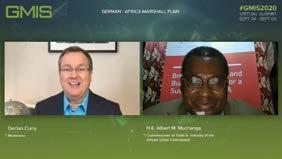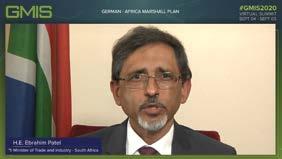
3 minute read
Fireside Chat: Germany’s Marshal Plan with Africa
DAY ONE:
H.E. JOÃO MANUEL GONÇALVES LOURENÇO H.E. ALBERT M. MUCHANGA
WATCH FULL VIDEO WATCH FULL VIDEO
Fireside Chat
H.E. EBRAHIM PATEL
WATCH FULL VIDEO WATCH HIGHLIGHTS
H.E. JOÃO MANUEL GONÇALVES LOURENÇO
President of the Republic of Angola
H.E. ALBERT M. MUCHANGA
Commissioner of Trade and Industry of the African Union
H.E. EBRAHIM PATEL
Minister of Trade and Industry, South Africa
GERMANY’S MARSHAL PLAN WITH AFRICA




Germany’s Marshall Plan with Africa marks a new era of cooperation between Europe and Africa that could drive industrial development and deliver huge opportunities for Africa’s fast-growing youth population.
This was the key message during an insightful discussion on the collaborative initiative, which aims to help bolster entrepreneurship and innovation and create the estimated 20 million new jobs needed in Africa every year.
H.E. João Manuel Gonçalves Lourenço, President of the Republic of Angola, stressed the need for strong government, appropriate oversight, and flexibility in implementing the plan.
“The Marshall Plan should focus the goals of the 2063 African Union agenda, whereby the EU and Africa should cooperate on a political, economic, social and cultural level in order to ensure the progress of our continent,” said Lourenço. “On our side, we commit to forwarding the assistance that we’ll be receiving to the right areas in order to ensure better monitoring in the implementation of different programs. Weak leadership in projects is a waste of resources, and that is what we need to prevent.”
H.E. Albert M. Muchanga, Commissioner of Trade and Industry - African Union Commission, emphasised the importance of publicprivate partnerships to help Africa develop new and sustainable opportunities for young people.
“For us to ensure that we dynamise the process of industrialisation and also try to leverage the opportunities offered by the Fourth Industrial Revolution, we need to develop a partnership among the governments, academia, and the private sector,” said Muchanga. “We need governments to provide the policy framework and to provide public resources. And we need the private sector and academia to embark on vigorous training programmes as well as rigorous research and development programmes.”
Representing H.E. Cyril Ramaphosa, President of South Africa, H.E. Ebrahim Patel, Minister of Trade and Industry of South Africa, spoke

of the urgent need for Africa to start living up to its true potential by increasing its GDP and providing employment for a burgeoning youth population. Developing a strong manufacturing base, he said, was one way to shift from being a provider of raw materials and unprocessed agricultural products to becoming an importer of consumer goods.
“African countries are learning the hard lesson that we cannot remain simply exporters of raw materials and importers of finished goods like medical supplies and processed food products,” said Patel. “We must confront uncomfortable facts and deal with Africa’s position in the global economy. Africa has 17 per cent of the world’s population, yet only 3 per cent of the world’s GDP, 2 per cent of the global manufacturing output and 1 per cent of global steel production.”
H.E. JOÃO MANUEL GONÇALVES LOURENÇO
President of the Republic of Angola
GERMANY’S MARSHAL PLAN WITH AFRICA
H.E. ALBERT M. MUCHANGA Commissioner of Trade and Industry of the African Union
H.E. EBRAHIM PATEL Minister of Trade and Industry, South Africa









